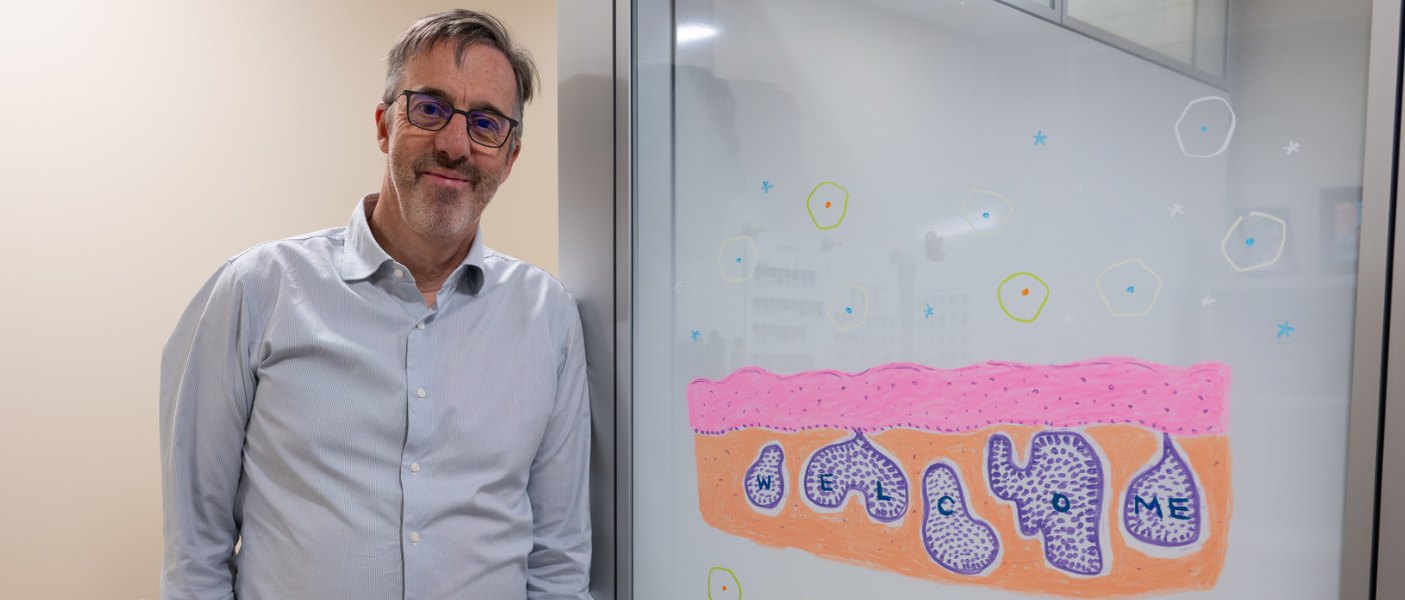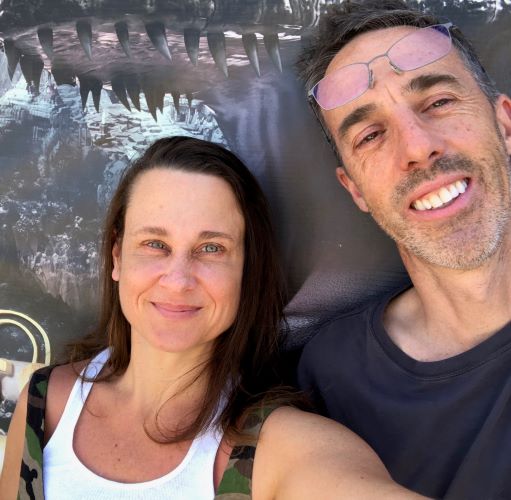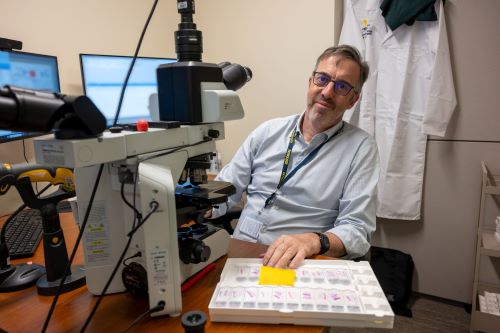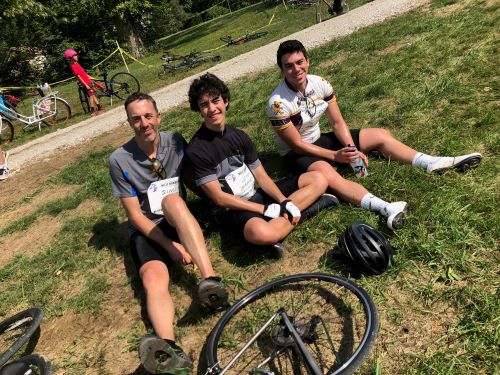

 The written word is powerful. It can shape our minds and change our dreams. Dr. Simon Warren loves the written word, studying Ancient Greek, Latin, and Linguistics while playing competitive squash at Cambridge University. One day, he picked up a book that changed the direction of his life: The Selfish Gene by Richard Dawkins. “I decided I wanted to know more about evolution, then more about DNA. I started chatting with people in science and medicine and decided to switch from the arts to the sciences, which is not something normally done in Britain. Most people go to medical school right from high school. I had to go back and take the high school science exams and work 9 months in a research lab to qualify for medical school.”
The written word is powerful. It can shape our minds and change our dreams. Dr. Simon Warren loves the written word, studying Ancient Greek, Latin, and Linguistics while playing competitive squash at Cambridge University. One day, he picked up a book that changed the direction of his life: The Selfish Gene by Richard Dawkins. “I decided I wanted to know more about evolution, then more about DNA. I started chatting with people in science and medicine and decided to switch from the arts to the sciences, which is not something normally done in Britain. Most people go to medical school right from high school. I had to go back and take the high school science exams and work 9 months in a research lab to qualify for medical school.”
Warren attended United Medical and Dental School of London University, after which he was a house officer in medicine for 6 months and surgery for 6 months. During this time, he realized that much of what happened to his patients depended on the pathology report, so he decided to pursue pathology training first in the UK and then in the US, followed by a two-year bench research fellowship in Immunobullous disease. He then transitioned to the University of Texas Southwestern Medical Center for a dermatopathology fellowship. “During my research fellowship, I was very fortunate and ended up with a first-author publication in the New England Journal of Medicine.”
 After completing his fellowships, Warren joined his research colleagues at the University of North Carolina at Chapel Hill for four years before spending 3 years in private practice Dermatopathology in Miami. He was recruited to the University of Indiana where he spent 16 years as director of the Dermatopathology Division, fellowship director, and several years as associate director of the IHC lab. “I began looking for a place that had more molecular offerings in the laboratory. There is a molecular revolution going on right now. It is crashing over pathology and dermatopathology. I wanted the opportunity to work with some of the top colleagues in the field and to have an opportunity to continue research.” He decided that the University of Michigan was the place to go.
After completing his fellowships, Warren joined his research colleagues at the University of North Carolina at Chapel Hill for four years before spending 3 years in private practice Dermatopathology in Miami. He was recruited to the University of Indiana where he spent 16 years as director of the Dermatopathology Division, fellowship director, and several years as associate director of the IHC lab. “I began looking for a place that had more molecular offerings in the laboratory. There is a molecular revolution going on right now. It is crashing over pathology and dermatopathology. I wanted the opportunity to work with some of the top colleagues in the field and to have an opportunity to continue research.” He decided that the University of Michigan was the place to go.
 In November 2024, Warren joined the faculty at the University of Michigan Department of Pathology. “I’m a clinical professor in dermatopathology, where I sign out dermatopathology cases, but also, for the first time in my career, I am signing out comparative genomic hybridization and melanoma FISH. That is new to me.” He is also continuing his research. “I am happy that I got two publications accepted and published in the last year, one in spatial transcriptomics for melanoma and one in molecular drivers of histiocytosis.” He also teaches fellows, residents, and medical students, which he finds invigorating.
In November 2024, Warren joined the faculty at the University of Michigan Department of Pathology. “I’m a clinical professor in dermatopathology, where I sign out dermatopathology cases, but also, for the first time in my career, I am signing out comparative genomic hybridization and melanoma FISH. That is new to me.” He is also continuing his research. “I am happy that I got two publications accepted and published in the last year, one in spatial transcriptomics for melanoma and one in molecular drivers of histiocytosis.” He also teaches fellows, residents, and medical students, which he finds invigorating.
“In the next ten years, I would like to bring some additional molecular methods to bear on melanoma. I want to improve our ability to diagnose it, apply spatial transcriptomics to improve our understanding of it, and find better ways to treat it.” Solving challenging disease cases is what makes pathology so enjoyable for him. “I like figuring out tough, impactful cases and, as a result, improving my understanding of a disease process. I love working with clinicians.”
 Some years ago, when Warren was interviewing medical students for residency, he spoke with a student who had been in Nepal and worked with a Leprosy hospital which also functions as a tropical dermatology hospital. “I considered what she said and realized they needed a dermatopathology lab.” Over the next five years, he developed a training program for their doctors and lab techs to run a dermatopathology lab. “I collected surplus donated equipment and worked with collaborators to ship it and get it set up.” He then did the same in Tajikistan. “When I trained a dermatopathologist in Tajikistan, I was able to bring him over for a year of fellowship training. He is now running the first Dermatopathology lab in Tajikistan and is training other people.” There were numerous challenges to overcome, such as adapting to electrical service at 240 volts instead of the 110 volts in the United States, and maintaining equipment in a country lacking the necessary infrastructure.
Some years ago, when Warren was interviewing medical students for residency, he spoke with a student who had been in Nepal and worked with a Leprosy hospital which also functions as a tropical dermatology hospital. “I considered what she said and realized they needed a dermatopathology lab.” Over the next five years, he developed a training program for their doctors and lab techs to run a dermatopathology lab. “I collected surplus donated equipment and worked with collaborators to ship it and get it set up.” He then did the same in Tajikistan. “When I trained a dermatopathologist in Tajikistan, I was able to bring him over for a year of fellowship training. He is now running the first Dermatopathology lab in Tajikistan and is training other people.” There were numerous challenges to overcome, such as adapting to electrical service at 240 volts instead of the 110 volts in the United States, and maintaining equipment in a country lacking the necessary infrastructure.
 In his personal time, Warren enjoys spending time with his family. He has three grown “American kids”: Vincent is getting married and works for Epic in Madison, Wisconsin; Lisa works in merchant banking in Boston, and the youngest, John, is at Indiana University, Bloomington studying computer programming. His wife, Kristi, is a runner, gardener, and home remodeler. Warren himself loves music. “I have been to four or five Lollapaloozas in Chicago and 3 Coachellas in the California desert.” He enjoys the outdoors, traveling, skiing, cycling, and sailing. He sails anything from dinghies to yachts. However, he no longer plays squash. “My knees just cannot handle it anymore. My 85-year-old Dad is the better tennis player at this point.”
In his personal time, Warren enjoys spending time with his family. He has three grown “American kids”: Vincent is getting married and works for Epic in Madison, Wisconsin; Lisa works in merchant banking in Boston, and the youngest, John, is at Indiana University, Bloomington studying computer programming. His wife, Kristi, is a runner, gardener, and home remodeler. Warren himself loves music. “I have been to four or five Lollapaloozas in Chicago and 3 Coachellas in the California desert.” He enjoys the outdoors, traveling, skiing, cycling, and sailing. He sails anything from dinghies to yachts. However, he no longer plays squash. “My knees just cannot handle it anymore. My 85-year-old Dad is the better tennis player at this point.”
 ON THE COVER
ON THE COVER
Breast team reviewing a patient's slide. (From left to right) Ghassan Allo, Fellow; Laura Walters, Clinical Lecturer; Celina Kleer, Professor. See Article 2014Department Chair |

newsletter
INSIDE PATHOLOGYAbout Our NewsletterInside Pathology is an newsletter published by the Chairman's Office to bring news and updates from inside the department's research and to become familiar with those leading it. It is our hope that those who read it will enjoy hearing about those new and familiar, and perhaps help in furthering our research. CONTENTS
|
 ON THE COVER
ON THE COVER
Autopsy Technician draws blood while working in the Wayne County morgue. See Article 2016Department Chair |

newsletter
INSIDE PATHOLOGYAbout Our NewsletterInside Pathology is an newsletter published by the Chairman's Office to bring news and updates from inside the department's research and to become familiar with those leading it. It is our hope that those who read it will enjoy hearing about those new and familiar, and perhaps help in furthering our research. CONTENTS
|
 ON THE COVER
ON THE COVER
Dr. Sriram Venneti, MD, PhD and Postdoctoral Fellow, Chan Chung, PhD investigate pediatric brain cancer. See Article 2017Department Chair |

newsletter
INSIDE PATHOLOGYAbout Our NewsletterInside Pathology is an newsletter published by the Chairman's Office to bring news and updates from inside the department's research and to become familiar with those leading it. It is our hope that those who read it will enjoy hearing about those new and familiar, and perhaps help in furthering our research. CONTENTS
|
 ON THE COVER
ON THE COVER
Director of the Neuropathology Fellowship, Dr. Sandra Camelo-Piragua serves on the Patient and Family Advisory Council. 2018Department Chair |

newsletter
INSIDE PATHOLOGYAbout Our NewsletterInside Pathology is an newsletter published by the Chairman's Office to bring news and updates from inside the department's research and to become familiar with those leading it. It is our hope that those who read it will enjoy hearing about those new and familiar, and perhaps help in furthering our research. CONTENTS
|
 ON THE COVER
ON THE COVER
Residents Ashley Bradt (left) and William Perry work at a multi-headed scope in our new facility. 2019Department Chair |

newsletter
INSIDE PATHOLOGYAbout Our NewsletterInside Pathology is an newsletter published by the Chairman's Office to bring news and updates from inside the department's research and to become familiar with those leading it. It is our hope that those who read it will enjoy hearing about those new and familiar, and perhaps help in furthering our research. CONTENTS
|
 ON THE COVER
ON THE COVER
Dr. Kristine Konopka (right) instructing residents while using a multi-headed microscope. 2020Department Chair |

newsletter
INSIDE PATHOLOGYAbout Our NewsletterInside Pathology is an newsletter published by the Chairman's Office to bring news and updates from inside the department's research and to become familiar with those leading it. It is our hope that those who read it will enjoy hearing about those new and familiar, and perhaps help in furthering our research. CONTENTS
|
 ON THE COVER
ON THE COVER
Patient specimens poised for COVID-19 PCR testing. 2021Department Chair |

newsletter
INSIDE PATHOLOGYAbout Our NewsletterInside Pathology is an newsletter published by the Chairman's Office to bring news and updates from inside the department's research and to become familiar with those leading it. It is our hope that those who read it will enjoy hearing about those new and familiar, and perhaps help in furthering our research. CONTENTS
|
 ON THE COVER
ON THE COVER
Dr. Pantanowitz demonstrates using machine learning in analyzing slides. 2022Department Chair |

newsletter
INSIDE PATHOLOGYAbout Our NewsletterInside Pathology is an newsletter published by the Chairman's Office to bring news and updates from inside the department's research and to become familiar with those leading it. It is our hope that those who read it will enjoy hearing about those new and familiar, and perhaps help in furthering our research. CONTENTS
|
 ON THE COVER
ON THE COVER
(Left to Right) Drs. Angela Wu, Laura Lamps, and Maria Westerhoff. 2023Department Chair |

newsletter
INSIDE PATHOLOGYAbout Our NewsletterInside Pathology is an newsletter published by the Chairman's Office to bring news and updates from inside the department's research and to become familiar with those leading it. It is our hope that those who read it will enjoy hearing about those new and familiar, and perhaps help in furthering our research. CONTENTS
|
 ON THE COVER
ON THE COVER
Illustration representing the various machines and processing used within our labs. 2024Department Chair |

newsletter
INSIDE PATHOLOGYAbout Our NewsletterInside Pathology is an newsletter published by the Chairman's Office to bring news and updates from inside the department's research and to become familiar with those leading it. It is our hope that those who read it will enjoy hearing about those new and familiar, and perhaps help in furthering our research. CONTENTS
|
 ON THE COVER
ON THE COVER
Rendering of the D. Dan and Betty Khn Health Care Pavilion. Credit: HOK 2025Department Chair |

newsletter
INSIDE PATHOLOGYAbout Our NewsletterInside Pathology is an newsletter published by the Chairman's Office to bring news and updates from inside the department's research and to become familiar with those leading it. It is our hope that those who read it will enjoy hearing about those new and familiar, and perhaps help in furthering our research. CONTENTS
|

MLabs, established in 1985, functions as a portal to provide pathologists, hospitals. and other reference laboratories access to the faculty, staff and laboratories of the University of Michigan Health System’s Department of Pathology. MLabs is a recognized leader for advanced molecular diagnostic testing, helpful consultants and exceptional customer service.